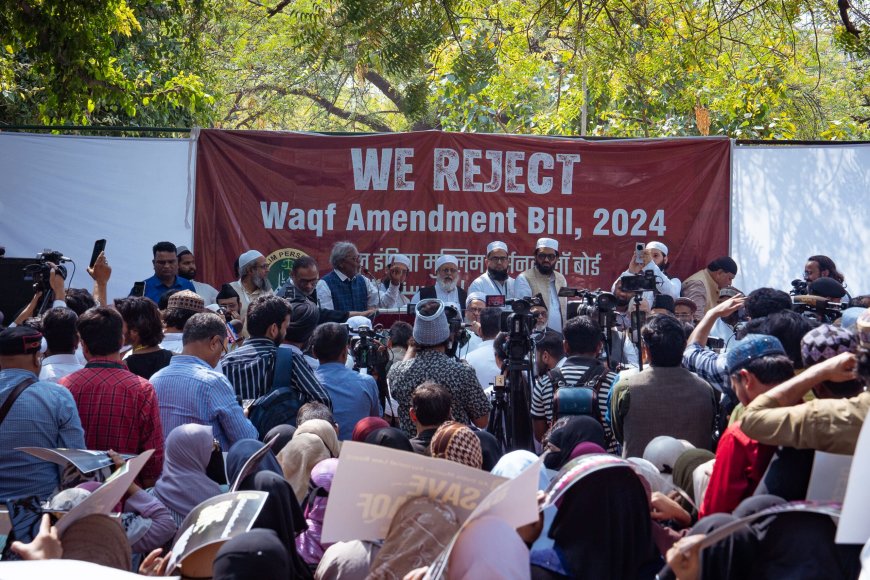Waqf Amendment Sparks Unrest: Violent Protests in West Bengal & Tripura Over Muslim Endowments
Protests against India’s Waqf (Amendment) Act erupted in West Bengal and Tripura, leading to violent clashes, arrests, and accusations of undermining Muslim charitable endowments.

Unrest Erupts Over Waqf Amendment in East India
Following the April 8 enactment of the Waqf (Amendment) Act, demonstrations erupted in West Bengal and Tripura, with thousands protesting what they claim is state interference in Muslim endowments. The unrest turned violent as tensions flared between demonstrators and law enforcement.
Violence in Murshidabad: Three Dead, Over 150 Arrested
In Murshidabad, West Bengal, demonstrations against the Waqf Amendment Act led to the deaths of three individuals—including a father and son found massacred in Jafrabad—and more than 150 arrests timesofindia.indiatimes.com+15indianexpress.com+15en.wikipedia.org+15keralakaumudi.com.
Protesters blocked National Highway 12, set fire to police vehicles, and vandalized public and private property, prompting the Calcutta High Court to deploy Central Armed Police Forces en.wikipedia.org+1newindianexpress.com+1. At least 15 police officers sustained injuries during multiple standoffs .
A high‑level judicial probe was ordered to assess lapses in security response, with early findings pointing to significant administrative failure uniindia.com+6ndtv.com+6economictimes.indiatimes.com+6.
Clashes in Tripura: Protesters and Police Injured
In Tripura’s Unakoti district, protests turned violent as demonstrators clashed with police. Around 4,000 people rallied in Kubjhar and Kailashahar, pelting law enforcement with stones. At least 18 officers were hurt and eight protesters were taken into custody ndtv.com+4uniindia.com+4timesofindia.indiatimes.com+4.
A local court remanded eight protesters to ten days’ judicial custody for their role in attacking police and disruptions during the rally uniindia.com.
The Waqf (Amendment) Act: Reforms and Backlash
The 2025 Amendment strengthens government oversight of waqf properties—Muslim charitable endowments—by mandating registration, introducing women’s representation on state waqf boards, and allowing inclusion of non-Muslim professionals economictimes.indiatimes.com+9en.wikipedia.org+9apnews.com+9.
Critics—including the All India Muslim Personal Law Board and Kapil Sibal—describe the law as an assault on religious autonomy, asserting it paves the way for the state to seize unregistered waqf properties timesofindia.indiatimes.com+3en.wikipedia.org+3apnews.com+3.
Political Fallout and Legal Review
West Bengal Chief Minister Mamata Banerjee refused to implement the Act in her state and appealed for communal harmony ndtv.com. Opposition leaders accused the BJP‑led government of engineering unrest to polarize communities .
The Supreme Court awaits petitions challenging the Act’s constitutionality, amid conflicting claims over government authority vs. religious freedom .
What Comes Next
-
Judicial scrutiny: The Supreme Court will hear arguments on the Act’s validity, including property rights and board composition mandates.
-
Parliamentary review: Political pressure may lead to amendments or repeal if implementation proves unsustainable.
-
Grassroots response: Localised protests continue, especially in communities with substantial waqf holdings lacking formal titles.
Key Takeaways
The Waqf Amendment ignited a serious backlash in Muslim-majority areas. Official data shows three fatalities and over 150 arrests, combined with several dozen injuries on both sides. Protesters view the law as an erosion of religious stewardship, while the government asserts it advances transparency and equity in religious endowments. As the legal system unfolds, both national and local responses will determine whether crises escalate—or are defused.














